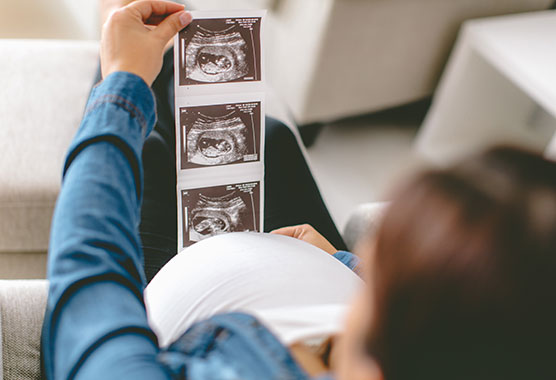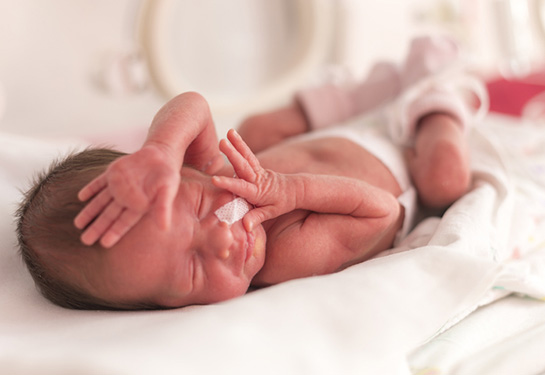Structural Birth Defects
Structural birth defects (also called fetal structural abnormalities) can lead to disabilities and may be life-threatening. Our fetal care team offers advanced services for your family throughout pregnancy.
Medically reviewed by Amy Powne, R.N. on Nov. 06, 2023.

Advanced Care for Fetal Structural Abnormalities
Structural birth defects occur while a baby forms in the womb (in utero). These changes include congenital heart defects, clubfoot, spina bifida and other conditions.
Fetal medicine specialists in our Fetal Care and Treatment Center expertly diagnose structural birth defects during pregnancy. In rare instances, we can intervene while your baby is still in the womb. Most structural birth defects require treatment after birth.
Our Difference
Team of Specialists
You and your unborn baby receive dedicated care. Our fetal medicine specialists work closely with your OB-GYN (who may specialize in high-risk pregnancies) and newborn experts (neonatologists). Your family also receives care, guidance and support from nurse coordinators, genetic counselors, social workers and other care team members.
Highest Level of Newborn Care
Newborns with structural birth defects often need advanced medical care or surgery. Our level 4 neonatal intensive care unit (NICU) provides the highest level of care for your baby.
Innovative Research
Our fetal specialists are dedicated to caring for babies diagnosed with birth defects, as well as improving diagnostic tests and treatments. We’re currently spearheading a world-renowned spina bifida clinical trial. The CuRe Trial focuses on a promising new treatment that combines fetal surgery and stem cell therapy.
What Are Structural Birth Defects?
Structural birth defects affect how a baby’s body forms while in the womb. These fetal structural abnormalities may affect a child’s organs, spine, limbs or facial features.
Types of Structural Birth Defects
Gastroschisis and Abdominal Wall Defects
Gastroschisis occurs when a baby’s abdominal wall doesn’t fully close. The opening allows organs like the intestines to form outside their body. A baby undergoes a procedure after birth to put the organs back in the abdomen and close the opening.
Cleft Lip and Cleft Palate
Cleft lip occurs when a baby’s lip doesn’t form completely. A cleft palate happens when the roof of the mouth (palate) doesn’t form completely and there’s an opening in the palate. A baby may have one or both conditions. The UC Davis Children’s Hospital Cleft and Craniofacial Team offers expert care, including surgery, to correct these structural changes.
Congenital Heart Defects
Congenital heart defects are the most common structural birth defect. These are changes in the shape or structure of a baby’s heart. These changes often affect how well the heart functions. We offer advanced fetal cardiology services.
Clubfoot and Limb Changes
Some babies have limbs that don’t form completely. Others have a foot that turns inward (clubfoot) because the tendons (tissues) that connect muscle to bone are too short. Our pediatric orthopedic surgeons expertly treat clubfoot and other limb issues.
Spina Bifida (Myelomeningocele)
Spina bifida (myelomeningocele) is a neural tube defect that affects the formation of a baby’s spine. Part of a baby’s spinal cord comes through an opening in the spine that didn’t close. Your unborn baby may benefit from a clinical trial that combines fetal surgery with stem cell therapy.
Causes and Risk Factors of Structural Birth Defects
Most structural birth defects occur for no known reason. Some birth defects run in families.
A gene change (mutation) can affect how a baby’s body develops in the womb. Some gene changes are passed from parent to child. Others happen unexpectedly.
These factors may increase the risk of structural birth defects:
Age
Being pregnant at age 35 or older may increase risk.
Environmental Factors
Exposure to certain chemicals or the use of some medications may make birth defects more likely.
Health Conditions and Infections
Having type 1 diabetes or type 2 diabetes may increase risk. Bacterial infections or viral infections during pregnancy are also risk factors.
Substance Use
Drinking alcohol, smoking or substance abuse during pregnancy may lead to birth defects.
"Congenital heart defects and critical CHDs," March of Dimes, https://www.marchofdimes.org/find-support/topics/planning-baby/congenital-heart-defects-and-critical-chds
"Birth defects and your baby," March of Dimes, https://www.marchofdimes.org/find-support/topics/planning-baby/birth-defects-and-your-baby
"What are birth defects?" Centers for Disease Control and Prevention (CDC), https://www.cdc.gov/ncbddd/birthdefects/facts.html
Request an Appointment
As Sacramento's No. 1 hospital, you'll benefit from unique advantages in primary care and specialty care. This includes prevention, diagnosis and treatment options from experts in 150 specialties.
Referring Physicians
To refer a patient, submit an electronic referral form or call.
800-4-UCDAVIS
Patients
Call to make an appointment.
Consumer Resource Center
800-2-UCDAVIS

Ranked among the nation’s best hospitals
A U.S. News & World Report best hospital in cardiology, heart & vascular surgery, diabetes & endocrinology, ENT, geriatrics, neurology & neurosurgery, and pulmonology & lung surgery.

Ranked among the nation’s best children’s hospitals
U.S. News & World Report ranked UC Davis Children’s Hospital among the best in pediatric nephrology, orthopedics*, and pulmonology & lung surgery. (*Together with Shriners Children’s Northern California)

Ranked Sacramento’s #1 hospital
Ranked Sacramento’s #1 hospital by U.S. News, and high-performing in aortic valve surgery, back surgery (spinal fusion), COPD, colon cancer surgery, diabetes, gynecological cancer surgery, heart arrhythmia, heart failure, kidney failure, leukemia, lymphoma & myeloma, lung cancer surgery, pacemaker implantation, pneumonia, prostate cancer surgery, stroke, TAVR, cancer, orthopedics, gastroenterology & GI surgery, and urology.

The nation’s highest nursing honor
UC Davis Medical Center has received Magnet® recognition, the nation’s highest honor for nursing excellence.

World-class cancer care
One of ~59 U.S. cancer centers designated “comprehensive” by the National Cancer Institute.

A leader in health care equality
For the 13th consecutive year, UC Davis Medical Center has been recognized as an LGBTQ+ Healthcare Equality Leader by the educational arm of America’s largest civil rights organization.

